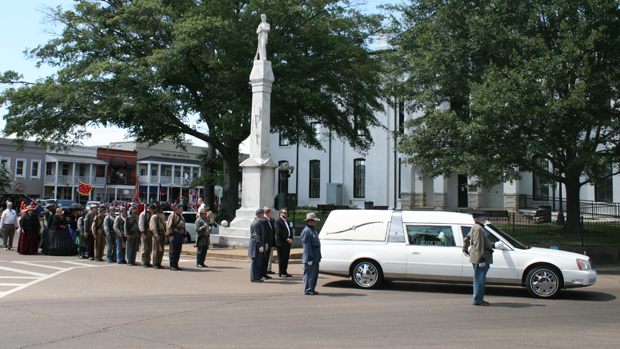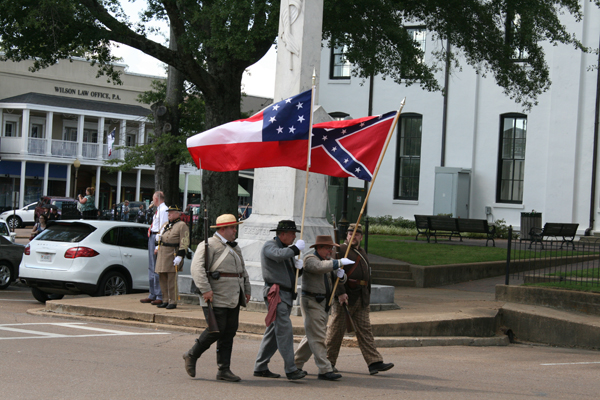
The controversial Southern Activist was killed in a mysterious car accident July 19th.


Oxford, Miss. (TLV)–It was the largest Confederate funeral and procession seen in Oxford, Mississippi in a century.
Hundreds of friends, supporters, Civil War reenactors, flaggers, bikers, journalists, and onlookers took over the Oxford Square on Sunday, August 2, 2015 to celebrate, honor, document, and observe the funeral of Anthony Hervey, one of the most controversial black activists Mississippi has ever produced.

Some knew him as the “Black Confederate” or “Black Rebel,” but Hervey called himself a “Black Redneck.” He was known for his Southern activism in Oxford and Ole Miss over the last couple of decades, which included marching around town in a Confederate soldier uniform, waving a Confederate Battle Flag, and demonstrating with controversial signs on the steps of the Square’s Confederate memorial. He got people’s attention simply because he was black.

Hervey died under mysterious circumstances in a car crash on July 19 after speaking at a rally to save a Confederate memorial in Birmingham, Alabama.
The only survivor of the accident, Arlene Barnum, told authorities and the media that the SUV Hervey and Barnum were travelling in was forced off the road by a carload of “angry young black men” after Hervey stopped at a convenience store near the Pontotoc-Lafayette County border wearing a Confederate kepi.

Barnum’s comments drew national media interest and condemnation from the Southern Heritage movement across the country.
The Sons of Confederate Veterans mobilized a full Confederate Honor Funeral and Procession to honor Anthony Hervey in Oxford.

Hervey’s funeral was held at the First Baptist Church in Oxford on Sunday, August 2 with local physician Dr. Willis N. Dabbs of the Urgent Care Clinic giving the eulogy.
“I had the privilege of being Anthony Hervey’s Sunday School teacher,” said Dr. Dabbs. “Anthony Hervey was unique. He was my friend.”
Hervey was born in Water Valley, Mississippi in 1965, but attended Oxford High School. He served in the United States Army and received a Master’s degree from the University of London in London, England. Hervey lived in Oxford and attended the First Baptist Church when he could.

According to Dr. Dabbs, Hervey emailed him after first visiting First Baptist, wanting to make sure he and his wife attending the church wouldn’t detract from other people learning the church’s message.
“He said in an email, ‘Some people find me disruptive,’” explained Dr. Dabbs.
“Most of the people who fuss so much about the man never bothered to talk to him,” Dabbs later remarked, drawing many an “Amen” from those present.
Dabbs went on to read directly from Hervey’s book, Why I Wave the Confederate Flag: Written by a Black Man. He didn’t think anyone but Hervey could do a better job of explaining what it was he believed and why.

“I think he would want the Confederate flag displayed proudly,” Dr. Dabbs said. “I think he’d want somebody to explain why he felt that way.”
The First Baptist Church did not allow flags of any sort inside the sanctuary at Hervey’s funeral; however the procession immediately following was a much different story. Hervey’s casket was loaded into a white hearse with a large Mississippi flag, while bagpipe music played.
Starting in the Mid-Town Shopping Center parking lot, dozens upon dozens of people, cars, and motorcycles lined up with Hervey’s hearse leading the way, much like the many Christmas or Independence Day parades Oxford has seen over the years. The procession made its way south on North Lamar Boulevard and around the Square, stopping long enough in front of the Confederate statue to honor Anthony Hervey and his favorite spot for demonstrating.
 The procession featured countless flags, including Confederate Battle Flags, official flags of Mississippi and the Confederacy, and even lessor known flags like the Bonnie Blue, Polk’s flag, Van Dorn’s flag, a Louisiana Confederate flag, and the Black Flag. The most eye catching flag of them all, however, was a gigantic Confederate Battle Flag that took up at least two lanes of traffic and took nearly 30 people to display.
The procession featured countless flags, including Confederate Battle Flags, official flags of Mississippi and the Confederacy, and even lessor known flags like the Bonnie Blue, Polk’s flag, Van Dorn’s flag, a Louisiana Confederate flag, and the Black Flag. The most eye catching flag of them all, however, was a gigantic Confederate Battle Flag that took up at least two lanes of traffic and took nearly 30 people to display.
Civil War reenactors and representatives of the Sons of Confederate Veterans marched alongside Hervey’s hearse, while friends and participants sang “Dixie.”

Anthony Hervey is survived by his wife Paula Tingle Hervey of Oxford, Mississippi; his daughters Cheyenne Hervey and Jaydee Hervey both of London, England; his sons, Nehemiah Hervey and Austin Hervey both of Oxford; his father, Harry Hervey, Sr. of Oxford; his sisters, Paulie Ann Gilliom (Brian) of Water Valley, Mississippi and Yolinda Cobb (Cedric) of Tupelo, Mississippi; his brothers Samuel Hervey (Trece) of Chicago, Illinois, Barry Hervey of Joliet, Illinois, Jack Hervey and Harry Hervey, Jr., both of Monroe, Louisiana; and a host of other relatives. Hervey was preceded in death by his mother, Katherine Campbell Hervey, his sister Linda Carol Campbell, and his brother Theron Campbell.
Anthony Hervey was born on October 27, 1965 and died July 19, 2015. He was 49 years old. ![]()
–








Related Articles:
“Death of the Black Confederate: Mysterious Circumstances Surround the Passing of Anthony Hervey” by Newt Rayburn (published in TLV #234, 7/23/2015)
“Remembering Anthony Hervey” by Louis Bourgeois (published in TLV #234, 7/23/2015)
“Anthony Hervey’s Funeral Set for Sunday, August 2nd in Oxford, Mississippi” by TLV News (7/26/2015)



I was with the reenact or contingent there to honor Mr. Hervey. The family was most gracious and I felt deeply for their loss. It was truly an honor to be there to commemorate his life and work.
I felt we were not treated well by the city of Oxford. We were forced to leave the Mid-Town Shopping Center and move across the street because of the battle flags being flown. The police even went so far as to make my friend move his truck because it has an SCV license plate. The procession was supposed to stop, hold a 10-20 minute memorial, fire a musket salute, then continue. Oxford police ordered us not to stop, but to just keep moving and get it over with.
This funeral was time for us to come together and celebrate the life of a man who regardless of color, loved the South. The city of Oxford seemed to go out of their way to make that difficult.
Rest brave soldier, you saw your duty and your battle is won.